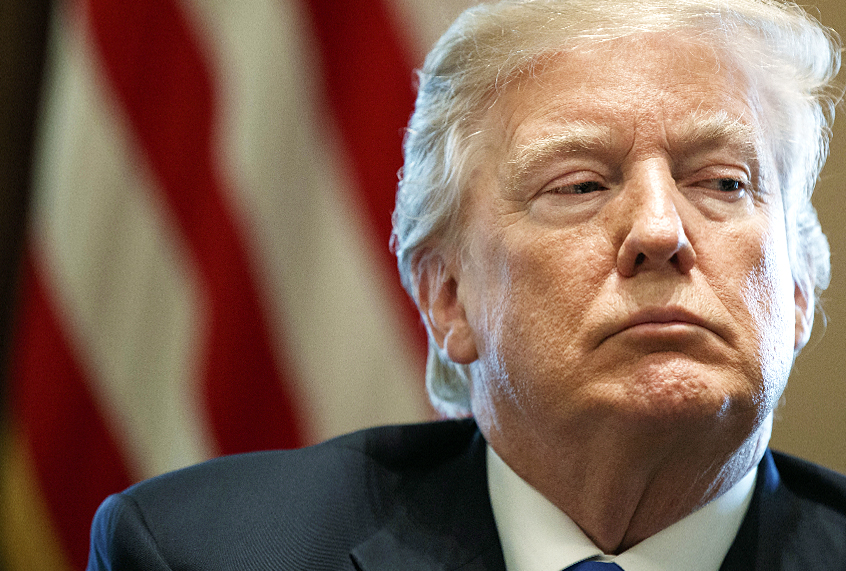Donald Trump is no friend of black people. This fact is so obvious that a large number of white Americans are finally starting to acknowledge it. A new poll from the Washington Post and ABC News finds that 52 percent of Americans believe Trump holds “a racial bias against black people,” with 4o percent “strongly” believing that.
Unsurprisingly, there’s a strong split by party in those numbers, with Democrats viewing Trump as biased and Republicans seeing him as not. More than half of independents think he is.
In this question we also see the consistent gender gap in opinions of Trump. More than half of women view him as biased. Among men, it’s a more even split. Overall, the gap between men and women on the belief that Trump is biased is 10 points.
Eight in 10 black Americans think Trump is biased against them, and nearly two-thirds of Hispanics say that he is as well. Among whites, though, a plurality of respondents said that they think Trump isn’t biased against black people.
This divergence in white Americans’ opinions about Donald Trump’s dislike of black people should not be surprising. It is nothing new. Since before the founding of America, white supremacy has generated a sense of willful denial, fantasy and delusion in white people. For example, during Jim and Jane Crow and the civil rights movement’s struggle to bring down that evil regime, public opinion polls revealed that a majority of white respondents actually believed that black people had equal rights and opportunities in America.
The Washington Post-ABC poll also provides an opportunity for a teachable moment about how we discuss and understand racism in America. Even the language of its question — “Do you think Trump is biased against black people?” — demands an intervention and corrective.
First, “bias” is a common deflection in post-civil rights era “colorblind” racial discourse. It would be more accurate to ask whether respondents thought Trump was racist.
Second, racism is not an opinion. It is a fact. Although such a rhetorical evasion is common in post-civil rights era America (where labeling a white person a racist sometimes seems more offensive than racism itself), the existence of racism is not open to speculation or debate.
Part of the challenge in these conversations is a function of definition. Racism is not simply about stereotyping a person because of the color of their skin and the attributes somehow associated with their “racial” group. A more sophisticated understanding of racism emphasizes the connection between power and prejudice. The most complete and correct understanding of racism identifies it as consisting of both institutional and interpersonal power relationships that systematically privilege the dominant group (in the United States, this would be white people) while disadvantaging the out-group (here being nonwhites). Racism also operates independently of intention or a conscious desire for malice. Racism is not an “unknown unknown”: It is measurable by social science data and other means.
As demonstrated by his words and deeds, as well as the types of public policies and laws that he endorses and has already enacted, Donald Trump is a racist by every correct understanding of the concept.
Moreover, given Donald Trump’s embrace of white identity politics and subsequent support by white supremacists whom he has described as “very fine people,” there are millions of white voters who support him not despite his racism but because of it.
Instructively, the Washington Post-ABC poll also reported these findings:
Unsurprisingly, most of those who approve of Trump’s job performance don’t view him as biased. But many do: Ten percent of those who approve of him believe him to be biased against black people, including 7 percent of those who strongly approve. (Five percent of those who strongly approve of Trump also strongly believe that he’s biased against black people.)
If Trump is looking for good news from this poll question, that may be it: For some Americans, seeing Trump as biased against black people doesn’t keep them from supporting him as a president.
In the United States, there certainly has been much mixed progress along the color line.
Although resurgent under Donald Trump and the Republican Party’s regime, formal and open white supremacy has largely been beaten back out of the public sphere since the civil rights era. America remains a society structured in many ways around maintaining and protecting white privilege, but the overt public expression of such values and beliefs is now considered anathema.
Donald Trump’s election highlights the deep and enduring power of white supremacy in America. His movement is also opposed by a racially diverse coalition of Americans who see Trumpism as an existential threat to the country’s cosmopolitan and multicultural democracy.
But the Post-ABC poll is also a warning. Social scientists have long documented that many individuals are dishonest in their answers on public opinion polls because they are motivated by a need for “social desirability.” As such, they want to give what the perceive to be the “right” answer as opposed to a more truthful answer that might be viewed as untoward or controversial. Consequently, the percentage of poll respondents who agree that Trump is a racist — and who support him because of that fact — is likely much higher.
Trump rode a wave of white supremacy into the White House. In 2020 he will seek to ride that same wave again, buoyed by the millions of white Americans who embrace and share his racist views, whether or not they are willing to confess them to pollsters.


